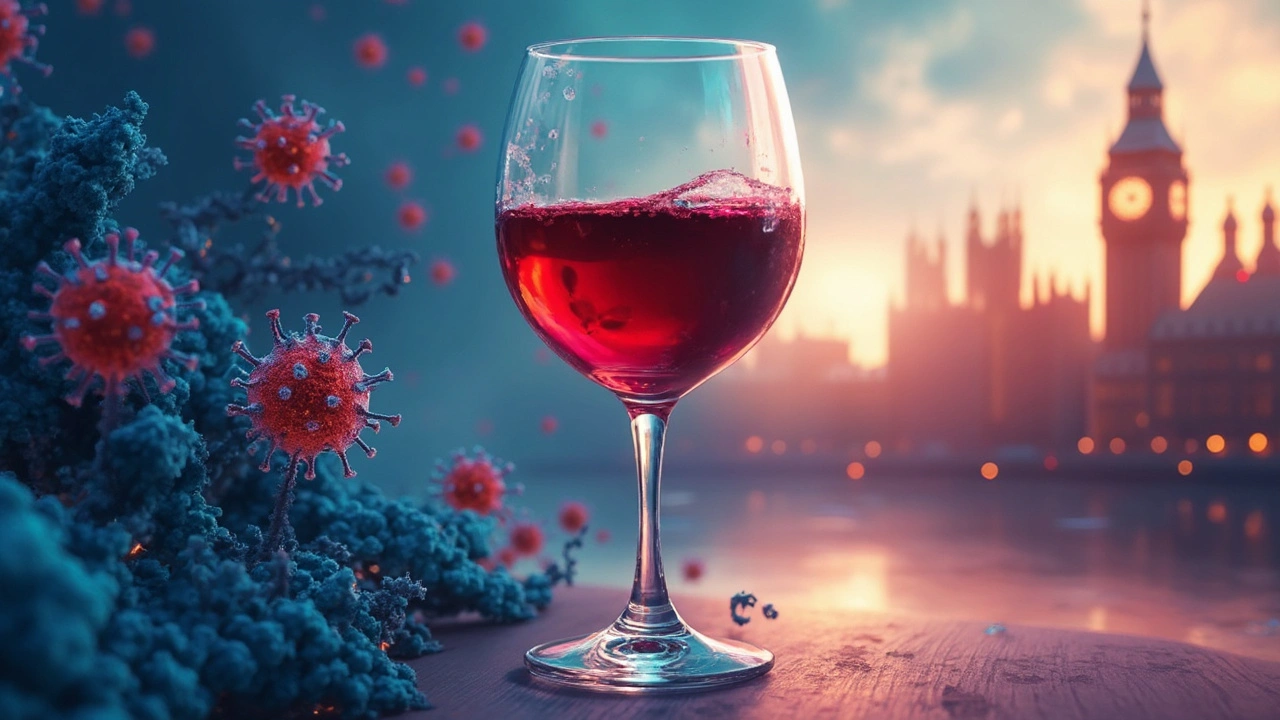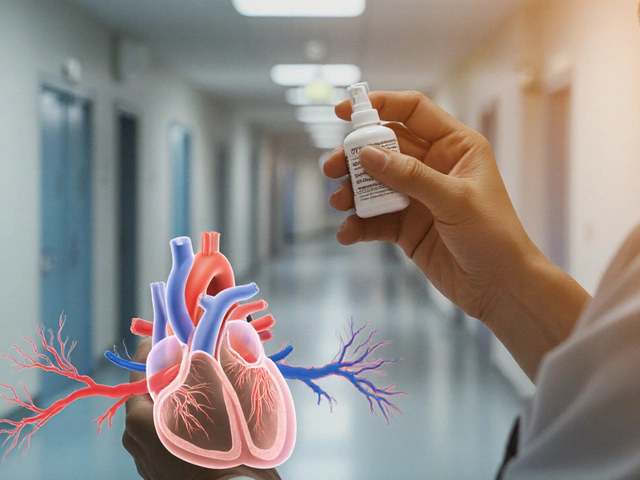Inflammation isn't just a buzzword plastered across wellness blogs; it's a major player in our health scene. Imagine your body's alarm system, going off when there’s harm, like an injury or illness. That’s inflammation for you. But what happens when alcohol enters the mix?
Alcohol's relationship with inflammation is like that of a fair-weather friend. It seems fun at first, but things can get dicey. Sure, occasional drinking might not set off alarm bells, but regular binge-drinking? That's like pouring fuel on the inflammatory fire.
Consider this: long-term alcohol use can crank up your body's inflammation levels, setting you up for a cocktail of chronic illnesses. Heart disease, liver problems, and even certain cancers could all feature on this not-so-great list. Kind of makes you rethink that extra drink, huh?
- What is Inflammation?
- Alcohol's Role in Inflammation
- Short-term vs Long-term Effects
- Alcohol's Impact on Chronic Diseases
- Making Informed Choices
What is Inflammation?
Inflammation is like your body's very own superhero response team. Imagine someone sounding an alarm when there's trouble, like bacteria invading your space or when you cut your finger while cooking. That's essentially what inflammation does—it calls in the troops to fight off whatever's causing damage and start the healing process.
But hold up! Inflammation is a good thing, right? Well, yes and no. While acute inflammation (the kind that kicks in after a sprained ankle) is your body's way of saying, 'I've got this,' chronic inflammation is a different story. It's like the annoying guest that won't leave the party, sticking around long after they’re welcome.
Types of Inflammation: Acute vs. Chronic
Acute inflammation is quick and localized. It's your body's initial response and generally subsides once the issue is resolved. Think of it like a short-term alert to fix immediate problems.
On the flip side, chronic inflammation sets in when your body decides to keep the threat alert signal on long after the danger has passed. This slow, creeping condition can lead to a whole range of health issues over time, including arthritis, heart disease, and maybe even some types of cancer.
Why Does it Matter?
You might wonder why we're putting inflammation under the microscope. The thing is, when your body stays in this heightened inflammatory state, it becomes ground zero for diseases. Research has shown that chronic inflammation can contribute to 60% of all deaths worldwide—yeah, that's a jaw-dropper.
So, it's no surprise that lifestyle choices, like alcohol consumption, play a role here. Balancing what you eat, drink, and how you live can affect how much inflammation your body has to deal with daily.
Are there signs that your body is dealing with inflammation? You bet! Typical signals include redness, warmth, swelling, and pain. And if it's chronic, you might notice fatigue or even body aches. Keeping an eye on these signs can be key in managing inflammation effectively.
Alcohol's Role in Inflammation
When it comes to alcohol and inflammation, it's a bit of a see-saw game. You may have heard that a small glass of red wine can be heart-friendly, thanks to its antioxidants. That's partially true. In moderation, alcohol might help certain body functions. But let's not get too carried away.
Alcohol affects inflammation through different pathways, some beneficial, some not so much. A couple of drinks every now and then might not hurt. But push past moderation, and you're talking serious inflammation risk.
How Alcohol Influences the Body
Alcohol acts like an unwelcome guest in your body's immune system. At a molecular level, it can influence cytokines, which are chemical messengers that signal your body to mount an inflammatory response. While a touch of these cytokines is necessary during injury or infection, chronic consumption turns them into inflammation superchargers, leading to excessive body strain.
Immediate vs. Long-term Effects
In the short term, a drink or two might relax your blood vessels, causing minor drops in inflammation. However, dive into heavy drinking and you're dealing with increased blood levels of C-reactive protein (CRP), a marker of inflammation linked to several chronic diseases, like diabetes and heart issues.
Breaking Down the Impact
- Liver Health: Perhaps the most famous victim of alcohol, the liver, suffers from both fatty accumulations and inflammation, a combo that can lead to cirrhosis.
- Gut Health: Alcohol changes gut microbiota composition, allowing harmful bacteria to flourish and worsen inflammation, sometimes leading to leaky gut syndrome.
- Overall Immune Function: Alcohol can compromise immune responses, making you more susceptible to infections while slowing down recovery.
For those who enjoy a drink, knowing these effects can help in making smarter choices. Remember, balance is key, and knowing the health risks of alcohol's inflammatory role can guide you towards healthier lifestyle decisions.

Short-term vs Long-term Effects
Ever wondered why that first drink at a party feels like pure fun, but if you overdo it, you’re regretting it the next morning? That's where the short-term effects of alcohol come into play. In the short-term, alcohol can relax you, lower your inhibitions, and maybe even get you feeling sociable if that's your thing.
But don't get too comfortable, because there's a downside. Increased inflammation can start almost immediately. Even within a few hours of drinking, your body reacts. Your liver, the hero tackling the alcohol, gets inflamed rapidly. Ever noticed that bloated feeling after a heavy night out? That's your body signaling increased inflammatory responses.
Short-term Effects
- Relaxation but at the cost of response time and coordination.
- Increased heart rate and possible rise in blood pressure.
- Upset stomach or headache due to dehydration.
Now, let's talk about what happens when casual drinks turn into a weekend habit or more. The long-term effects of alcohol are not just scary tales told by doctors. Consistent drinking can promote chronic inflammation, impacting your organs significantly.
Long-term Effects
- Increased risk of heart disease due to prolonged inflammation.
- Potential for developing liver disease, including cirrhosis.
- Risk of certain cancers like esophageal and liver cancer.
A study from the National Institute on Alcohol Abuse and Alcoholism found that more than half of adults with heavy drinking habits show elevated alcohol-related inflammation markers. That's a bright red flag right there.
Knowing these outcomes might make you rethink that extra glass of alcohol. The key is moderation. Enjoy a drink, but treat your body like a friend rather than an enemy. After all, the goal is to keep that inflammation under control!
Alcohol's Impact on Chronic Diseases
Beer, wine, and spirits. They all seem pretty harmless on a night out with friends or a cozy evening with Netflix. But here's the kicker: when you make it a regular habit, alcohol starts pulling strings in some not-so-great ways, especially concerning your health.
Let's start with your heart. The link between alcohol and heart disease has been well-established. Regular excessive drinking can lead to increased blood pressure and alter how your heart functions - not a great combo for keeping things ticking smoothly.
Then there’s your liver. We know it as the organ that filters out toxins, but give it too much alcohol, and it can become overworked. Chronic inflammation of the liver from booze can lead to conditions like fatty liver, hepatitis, or even cirrhosis. These aren't just words; they’re life-changing diagnoses.
"Alcohol is a known human carcinogen, increasing the risk of cancers of the mouth, throat, esophagus, liver, and breast." - National Cancer Institute
Cancer risk can also jump up. Alcohol is tagged as a carcinogen, meaning it can cause cancer. Mouth, throat, liver, and breast cancer are all notorious risks when alcohol enters the picture.
| Chronic Disease | Impact of Alcohol |
|---|---|
| Heart Disease | Increases blood pressure, can lead to heart failure |
| Liver Disease | Causes fatty liver, hepatitis, cirrhosis |
| Cancer | Increases the risk of several cancers including mouth and liver |
So, what's the takeaway? It’s not about swearing off drinks forever but understanding where the line is. If you're sipping a glass of wine now and then, you're probably okay. But if you're reaching for the bottle every day, it might be time to rethink your relationship with alcohol.

Making Informed Choices
When it comes to managing your health and inflammation, making smart decisions about your alcohol intake is key. Nobody's saying you have to go cold turkey unless you want to, or if your doctor advises it. But a few tweaks in your drinking habits can go a long way in keeping inflammation—and its nasty side effects—in check.
Know Your Limits
Being aware of your own limits is crucial. For men, it's typically advisable to not exceed two drinks a day, and for women, it's usually one. A 'drink' means one 12-ounce beer, 5 ounces of wine, or 1.5 ounces of spirits. Knowing this can help you enjoy responsibly.
Balance Your Lifestyle
Drinking isn't the only player in the inflammation game. Pairing moderate alcohol consumption with a good diet and some exercise can help your body manage inflammation better. Think of a balanced life as armor against chronic diseases.
Stay Hydrated
Heads up: alcohol dehydrates you. Keeping a glass of water handy while you're having an alcoholic drink can help mitigate its dehydrating effects. Plus, you'll likely feel better the next morning.
Listen to Your Body
If you're noticing that a couple of drinks make you feel worse—not better—it might be time to reassess. Alcohol affects everyone differently, and if it's throwing your body out of whack, it might be wise to cut back or stop altogether.
Making informed choices about alcohol can lead to a healthier, less inflamed life. It’s not just about avoiding the bad but actively choosing the good.



 Medications
Medications





Ismaeel Ishaaq
July 18, 2025 AT 12:57You know, it's wild how alcohol can do damage even when society glamorizes it like some magic potion.
Excessive drinking literally sparks those inflammatory fires inside us that can wreck all kinds of stuff. Diabetes, heart disease, you name it.
And yet people act like it’s no big deal to knock back a few drinks every day without considering the consequences. It’s like the body is silently screaming, and the next thing you know, bam! Chronic illness knocking at the door.
We need to take this stuff way more seriously.
Does anyone else feel like there’s more to this than meets the eye? Like maybe the inflammation caused by alcohol is a bigger underlying threat than white Americans or Europeans realize?
Because I've read the immune system really suffers—and fast.
Danielle Watson
July 23, 2025 AT 06:50I totally agree that the inflammatory effects of alcohol are often overlooked. There’s this cultural blind spot where drinking seems synonymous with relaxation and socializing, but the health consequences sneak up in subtle ways.
The post mentions balancing consumption, but I wonder if that balance is so individualized it’s hard to give generic guidelines. Like, does one glass of wine really help, or are we just kidding ourselves?
Every body reacts differently, right?
It’d be great if we had clearer, more nuanced research instead of buzzworthy headlines that paint red wine as some wonder drug.
Abby VanSickle
July 29, 2025 AT 01:43I appreciate that this post brings up the complexity here because often folks just see alcohol as either good or evil without considering the nuanced immune interactions. Chronic inflammation really is a silent threat that unlocks so many diseases.
While some people might tolerate moderate drinking with no apparent issues, we have to keep in mind that inflammation doesn't always present with obvious symptoms at first. It’s a hidden fire burning beneath.
I’d encourage anyone reading this to be mindful of their consumption patterns—not just quantity but frequency and personal health history. It’s never one-size-fits-all.
Edward Leger
July 31, 2025 AT 09:17Philosophically speaking, the body's response to alcohol reflects a deep tension between indulgence and preservation. Our neural and immune systems are finely tuned, yet alcohol perturbs this equilibrium through complex biochemical cascades.
Inflammation, as an immune response, serves a protective function against injury and infection; however, when chronically activated by substances like alcohol, it can paradoxically become destructive. This paradox challenges simplistic moral narratives on drinking.
What intrigues me is how this interplay between alcohol and the immune system symbolizes broader themes of balance and excess in human behavior. It echoes the age-old question: To what extent can we partake in potentially harmful pleasures without imperiling our well-being?
Kimberly :)
August 2, 2025 AT 19:37Honestly, I find the whole idea that a glass of wine might be *good* for you kind of suspect 🤨. The post nicely points out the variety of effects, but I want to push back at the glorification of alcohol in wellness spaces.
Sure, there might be antioxidants in red wine, but that doesn’t erase the fact that alcohol itself is a toxin that inflames your body.
People should stop using that as an excuse to drink daily because “it’s healthy.”
Would be way better if public health messaging were more radical about cutting back rather than enabling mild overconsumption.
Lilly Merrill
August 5, 2025 AT 00:23It’s interesting how cultural contexts shape how we talk about alcohol. In some places, it’s integral to bonding and identity, while in others it’s more taboo. This diversity complicates the message on inflammation and health.
From a cultural perspective, people often don’t realize that what seems like a harmless glass can have a biological ripple effect. Inflammation isn’t just some medical jargon; it’s inflammation of our relationships with self-care and boundaries.
Understanding this can help people make choices that respect both their heritage and their health.
Charlie Martin
August 5, 2025 AT 22:37Jumping in here because there’s something about this topic that fascinates me. Alcohol and inflammation cross paths in so many diseases but from a medical standpoint, we keep circling around the same ‘know your limits’ advice.
It always seems surface level, without getting into the gut microbiome disruption or the cellular signaling changes that alcohol triggers. These deep mechanisms amplify inflammation over time.
Does anyone else think we need a more scientific literate public discourse on alcohol's impact rather than oversimplified health tips?
Sebastian Miles
August 12, 2025 AT 01:50From a clinical coaching perspective, I’ve seen clients shocked by how much inflammation impacts their recovery progress from things like injury and stress. Alcohol often slips under their radar as a culprit.
Keeping inflammation low is foundational to sustained health gains. It’s not just about occasional drinking but cumulative load. That’s where the real issue lies.
Supporting moderation strategies rooted in personalized health data could be the game changer here instead of vague abstinence demands.
Harshal Sanghavi
August 13, 2025 AT 08:23I can’t help but be a little sarcastic about how we keep treating alcohol like some harmless classmate in this health story. It’s more like the sneaky bully igniting inflammation under the radar, pretending all is well.
Guess what? Context matters but science doesn’t beta-test on millennials wishing wine would just chill their inflammation.
It’s about time more hard truths came out with no sugar coating. If you’re using alcohol to relax, think about alternative ways before inviting chronic inflammation to your party.
chris macdaddy
August 14, 2025 AT 23:17Just to add, I always recommend people consider not only the immediate effects but the long-term systemic inflammation alcohol creates. It’s a beast that doesn’t just go away overnight.
The tricky part is how some folks feel fine for years while their inflammation silently builds up to a tipping point. Awareness and early lifestyle tweaks are key here, and so many don’t realize this until it’s too late.
It’s about informed choice, not fear-mongering. That balance is what everyone should strive for.
Moumita Bhaumik
August 17, 2025 AT 12:23Honestly, am I the only one suspicious of how the alcohol industry pushes narratives that downplay the inflammatory damage? There’s clearly a big money interest muddying public perception.
The post is right to highlight complexity, but don’t get distracted by the ‘moderate drinking is fine’ spin. Toxic effects accumulate and they’re quietly normalized by marketing.
Wake up, folks. Inflammation from alcohol is a link in a chain of diseases that corporations have no incentive to expose fully.